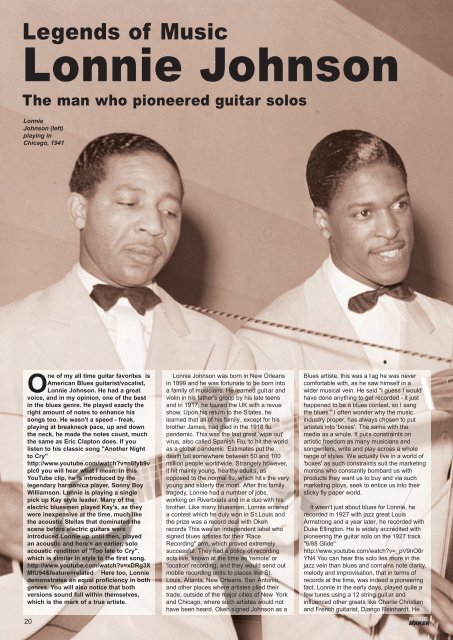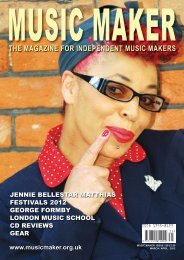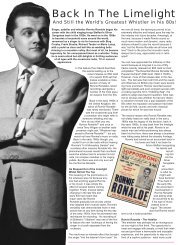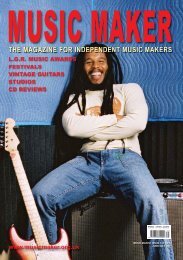the magazine for independent music makers - The Music Maker Guide
the magazine for independent music makers - The Music Maker Guide
the magazine for independent music makers - The Music Maker Guide
You also want an ePaper? Increase the reach of your titles
YUMPU automatically turns print PDFs into web optimized ePapers that Google loves.
Legends of <strong>Music</strong><br />
Lonnie Johnson<br />
<strong>The</strong> man who pioneered guitar solos<br />
Lonnie<br />
Johnson (left)<br />
playing in<br />
Chicago, 1941<br />
O<br />
ne of my all time guitar favorites is<br />
American Blues guitarist/vocalist,<br />
Lonnie Johnson. He had a great<br />
voice, and in my opinion, one of <strong>the</strong> best<br />
in <strong>the</strong> blues genre. He played exacty <strong>the</strong><br />
right amount of notes to enhance his<br />
songs too. He wasn't a speed - freak,<br />
playing at breakneck pace, up and down<br />
<strong>the</strong> neck, he made <strong>the</strong> notes count, much<br />
<strong>the</strong> same as Eric Clapton does. If you<br />
listen to his classic song "Ano<strong>the</strong>r Night<br />
to Cry"<br />
http://www.youtube.com/watch?v=n8fyb9v<br />
pIc0 you will hear what I mean. In this<br />
YouTube clip, he is introduced by <strong>the</strong><br />
legendary harmonica player, Sonny Boy<br />
Williamson. Lonnie is playing a single<br />
pick up Kay style leader. Many of <strong>the</strong><br />
electric bluesmen played Kay's, as <strong>the</strong>y<br />
were inexpensive at <strong>the</strong> time, much like<br />
<strong>the</strong> acoustic Stellas that dominated <strong>the</strong><br />
scene be<strong>for</strong>e electric guitars were<br />
introduced.Lonnie up until <strong>the</strong>n, played<br />
an acoustic and here's an earlier, solo<br />
acoustic rendition of "Too late to Cry".<br />
which is similar in style to <strong>the</strong> first song.<br />
http://www.youtube.com/watch?v=xDRg3X<br />
MfU94&feature=related Here too, Lonnie<br />
demonstrates an equal proficiency in both<br />
genres. You will also notice that both<br />
versions sound full within <strong>the</strong>mselves,<br />
which is <strong>the</strong> mark of a true artiste.<br />
20<br />
Lonnie Johnson was born in New Orleans<br />
in 1899 and he was <strong>for</strong>tunate to be born into<br />
a family of <strong>music</strong>ians. He learned guit ar and<br />
violin in his fa<strong>the</strong>r's group by his late teens<br />
and in 1917, he toured <strong>the</strong> UK with a revue<br />
show. Upon his return to <strong>the</strong> States, he<br />
learned that all of his family, except <strong>for</strong> his<br />
bro<strong>the</strong>r James, had died in <strong>the</strong> 1918 flu<br />
pandemic. This was <strong>the</strong> last great 'wipe out'<br />
virus, also called Spanish Flu, to hit <strong>the</strong> world<br />
as a global pandemic. Estimates put <strong>the</strong><br />
death toll somewhere between 50 and 100<br />
million people worldwide. Strangely however,<br />
it hit mainly young, healthy adults, as<br />
opposed to <strong>the</strong> normal flu, which hit s <strong>the</strong> very<br />
young and elderly <strong>the</strong> most. After this family<br />
tragedy, Lonnie had a number of jobs,<br />
working on Riverboats and in a duo with his<br />
bro<strong>the</strong>r. Like many bluesmen, Lonnie entered<br />
a contest which he duly won in S t.Louis and<br />
<strong>the</strong> prize was a record deal with Okeh<br />
records This was an <strong>independent</strong> label who<br />
signed blues artistes <strong>for</strong> <strong>the</strong>ir 'Race<br />
Recording" arm, which proved extremely<br />
successful. <strong>The</strong>y had a policy of recording<br />
acts live, known at <strong>the</strong> time as 'remote' or<br />
'location' recording, and <strong>the</strong>y would send out<br />
mobile recording units to places like St.<br />
Louis, Atlanta, New Orleans, San Antonio,<br />
and o<strong>the</strong>r places where artistes plied <strong>the</strong>ir<br />
trade, outside of <strong>the</strong> major cities of New York<br />
and Chicago, where such artistes would not<br />
have been heard. Okeh signed Johnson as a<br />
Blues artiste, this was a tag he was never<br />
com<strong>for</strong>table with, as he saw himself in a<br />
wider <strong>music</strong>al vein. He said "I guess I would<br />
have done anything to get recorded - it just<br />
happened to be a blues contest, so I sang<br />
<strong>the</strong> blues." I often wonder why <strong>the</strong> <strong>music</strong><br />
industry proper, has always chosen to put<br />
artistes into 'boxes'. <strong>The</strong> same with <strong>the</strong><br />
media as a whole. It puts constraints on<br />
artistic freedom as many <strong>music</strong>ians and<br />
songwriters, write and play across a whole<br />
range of styles. We actually live in a world of<br />
'boxes' as such constraints suit <strong>the</strong> marketing<br />
morons who constantly bombard us with<br />
products <strong>the</strong>y want us to buy and via such<br />
marketing ploys, seek to entice us into <strong>the</strong>ir<br />
sticky fly paper world.<br />
It wasn't just about blues <strong>for</strong> Lonnie, he<br />
recorded in 1927 with jazz great Louis<br />
Armstrong and a year later, he recorded with<br />
Duke Ellington. He is widely accredited with<br />
pioneering <strong>the</strong> guitar solo on <strong>the</strong> 1927 track<br />
"6/88 Glide"<br />
http://www.youtube.com/watch?v=_pV9nO6r<br />
YN4 You can hear this solo lies more in <strong>the</strong><br />
jazz vein than blues and contains note clarity,<br />
melody and improvisation, that in terms of<br />
records at <strong>the</strong> time, was indeed a pioneering<br />
fact. Lonnie in <strong>the</strong> early days, played quite a<br />
few tunes using a 12 string guit ar and<br />
influenced o<strong>the</strong>r greats like Charlie Christian<br />
and French guitarist, Django Reinhardt. He<br />
MUSIC<br />
MAKER





